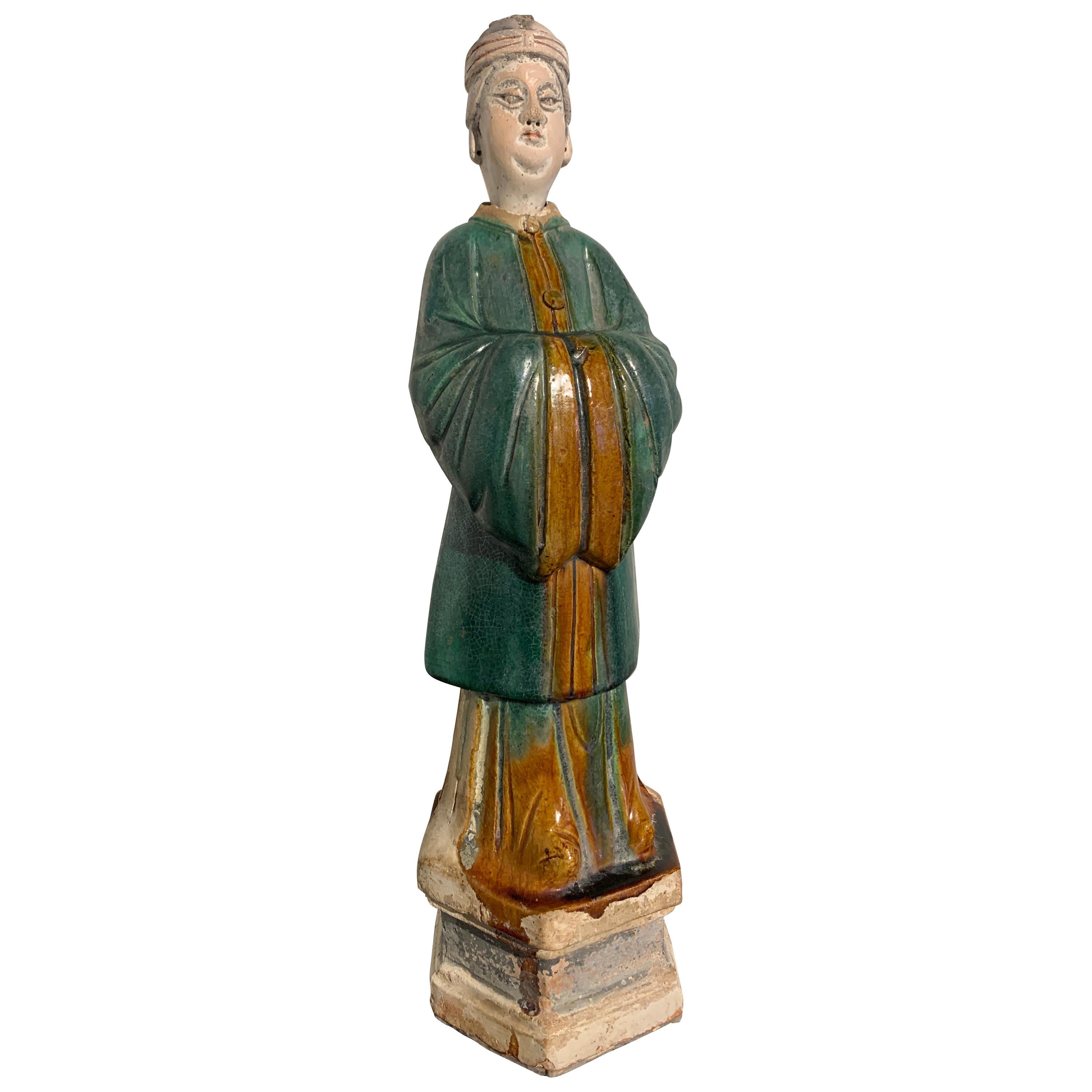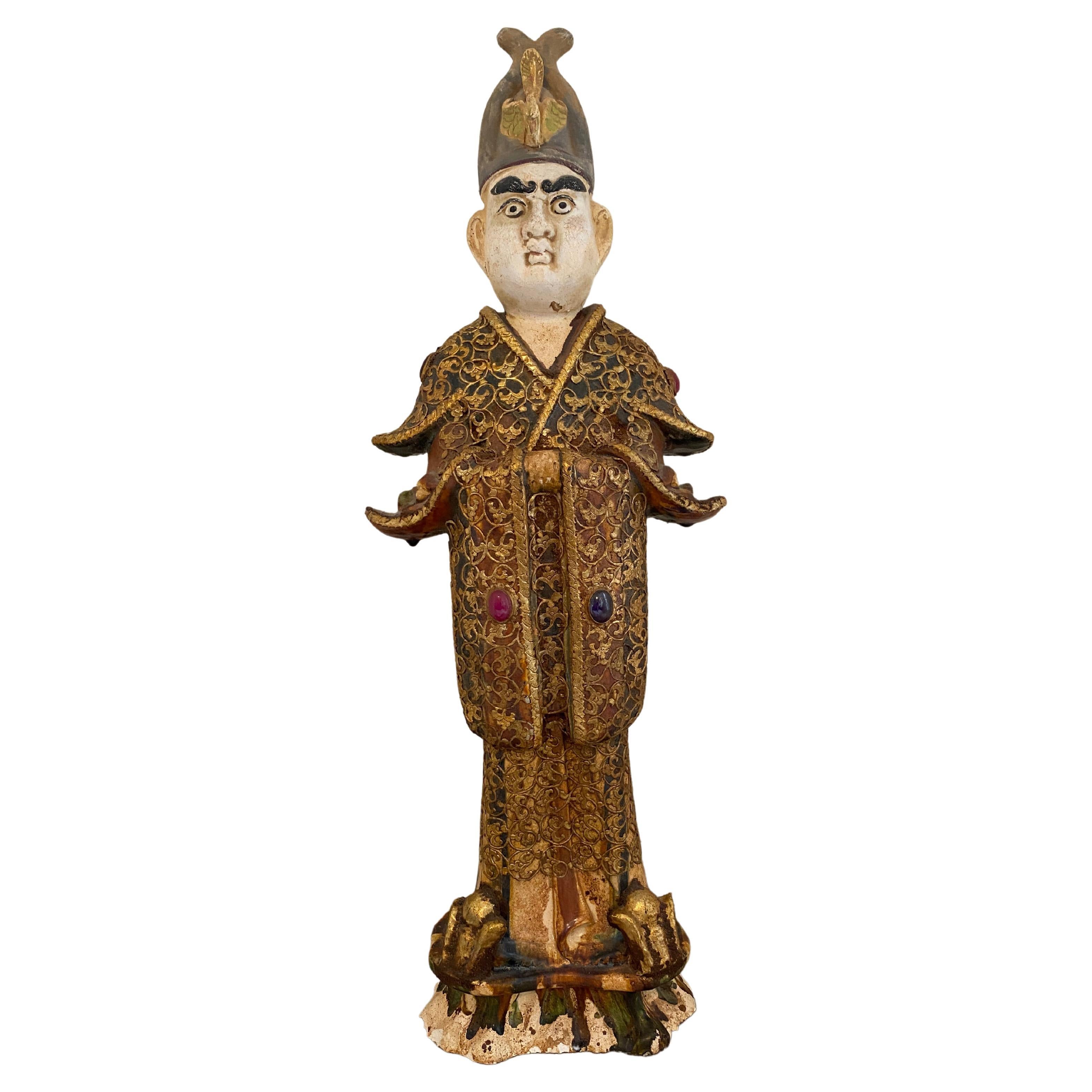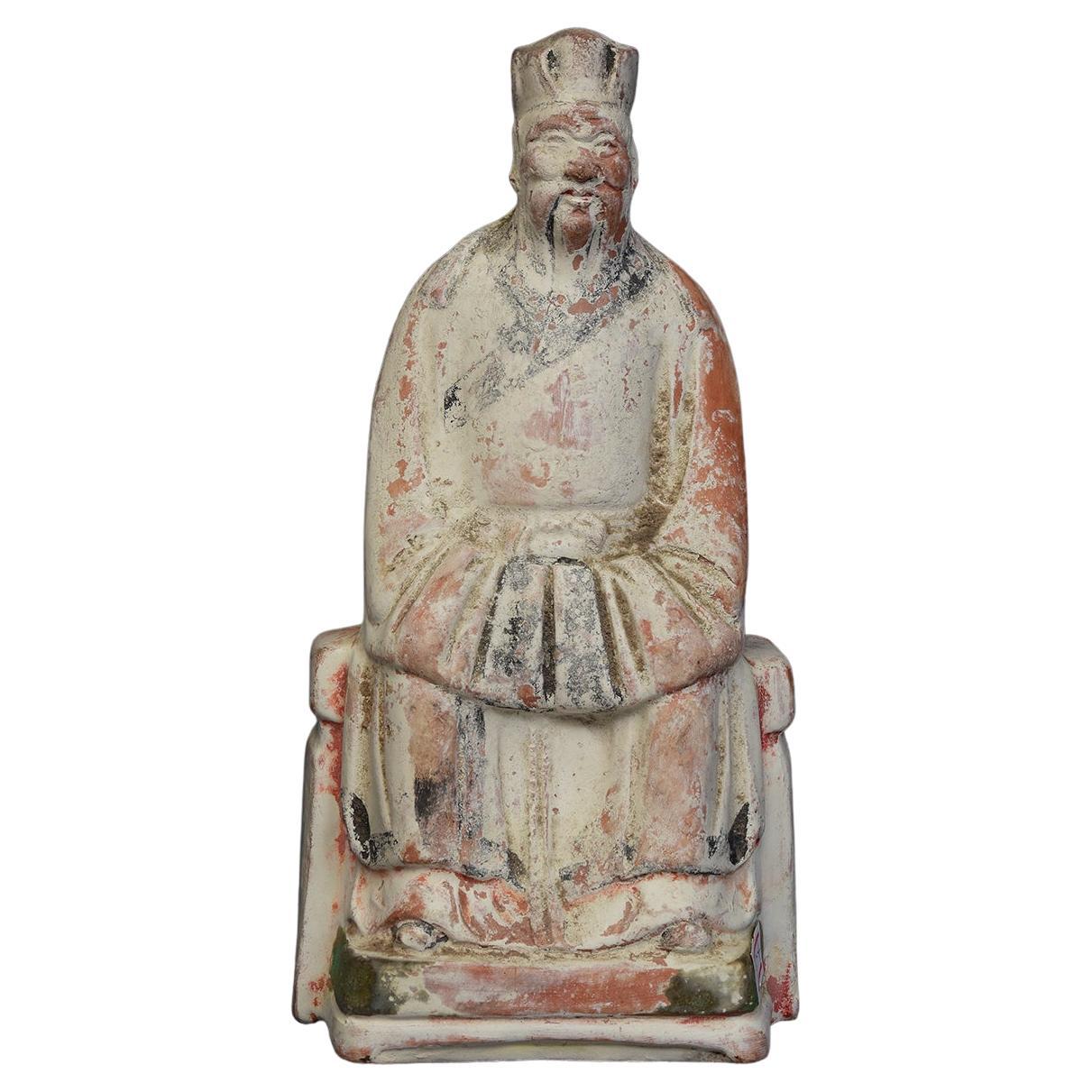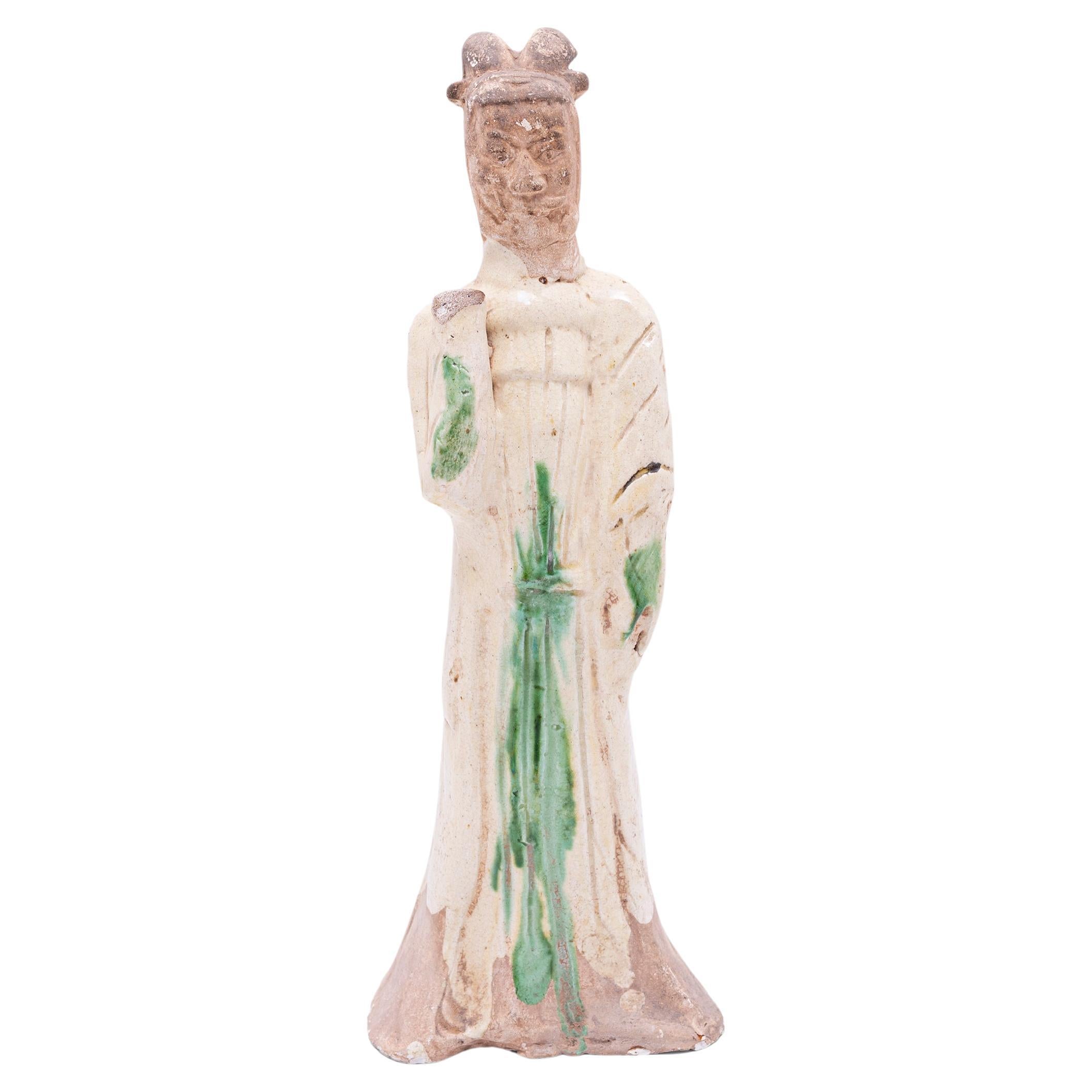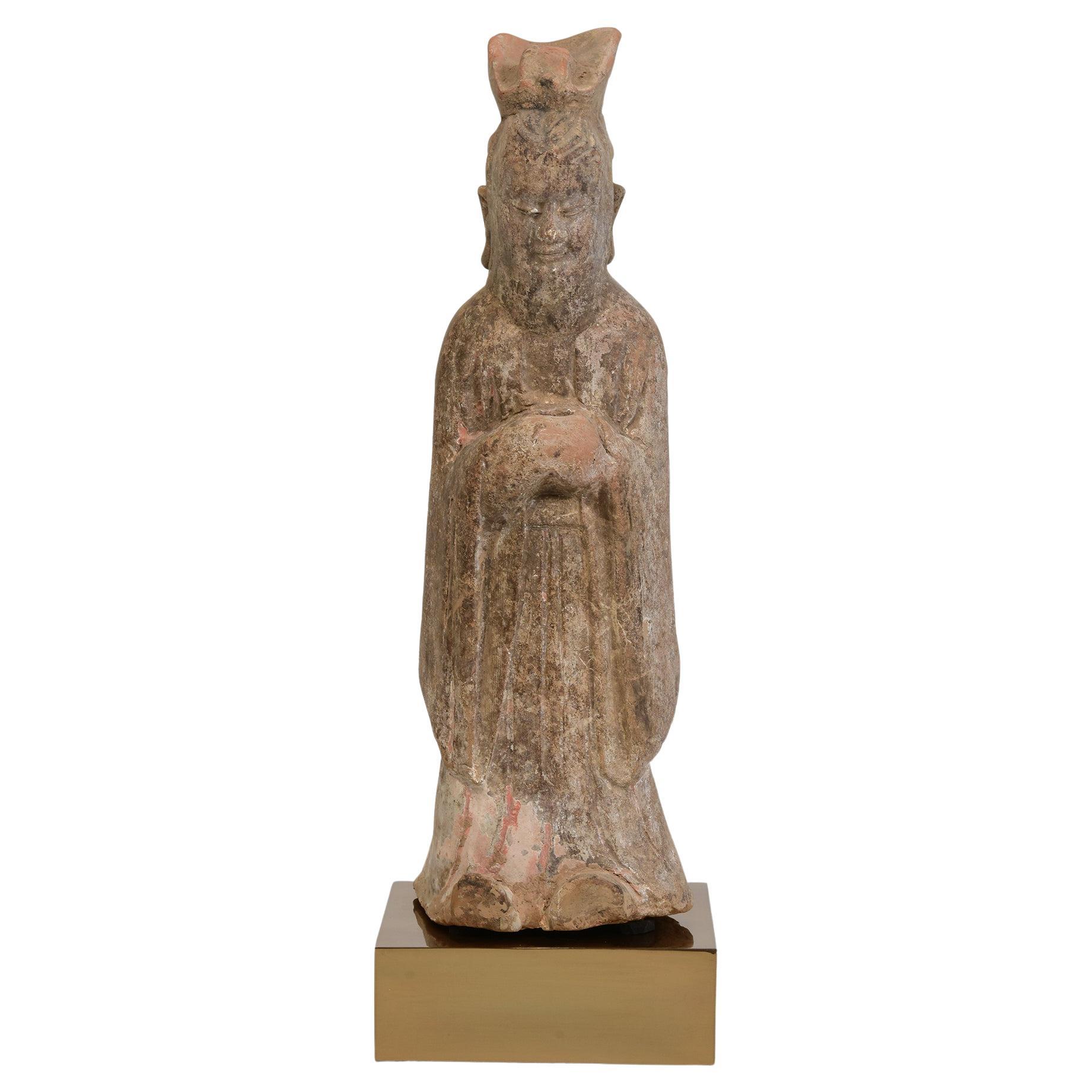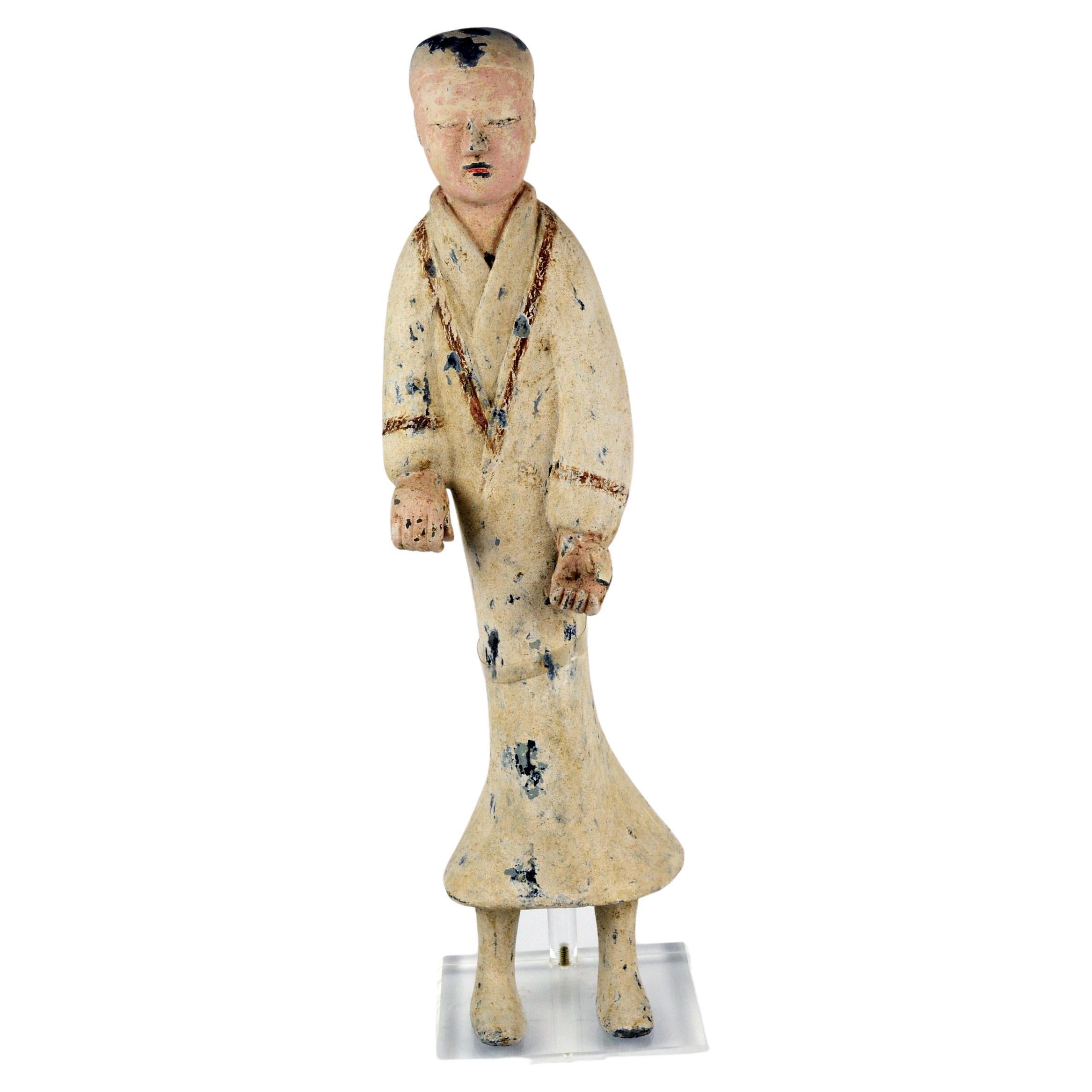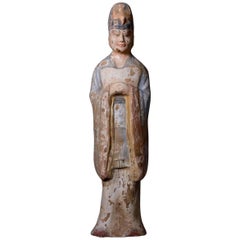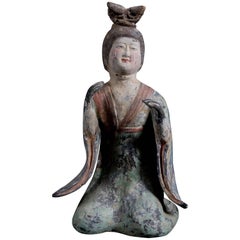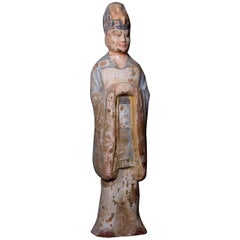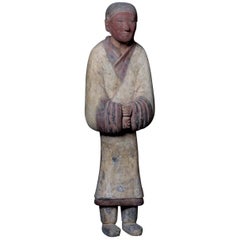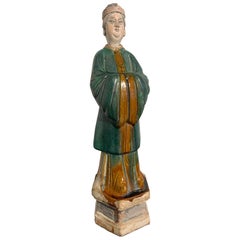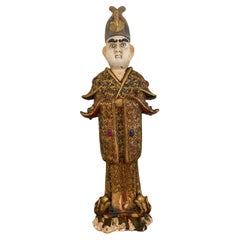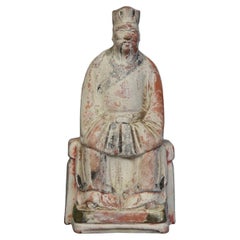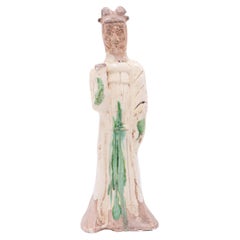Items Similar to Tang Dynasty Court Official in Sancai Glazed Robes, China '618-907' - TL Tested
Want more images or videos?
Request additional images or videos from the seller
1 of 12
Tang Dynasty Court Official in Sancai Glazed Robes, China '618-907' - TL Tested
$36,000
£27,589.65
€31,709.45
CA$50,563.77
A$56,590.18
CHF 29,622.94
MX$687,468.17
NOK 376,136.07
SEK 354,948.63
DKK 236,608.26
About the Item
A Tang dynasty sancai (three color) glazed pottery model of a Taoist official, TL tested by Ralf Kotalla - worldwide oldest private laboratory specialized for genuine thermoluminescence test analysis in Germany.
The figure is portrayed standing upon a pedestal in an observant position, dressed in traditional sancai (amber, green, and a creamy off-white) glazed robes, typical of this epoch. His clasped hands are joined in front beneath his long sleeves.
This figure bears the typical headdress for an official in the Tang dynasty and can be identified by the shape of his hat, traces of red pigment can still be observed. The phoenix that decorates his head indicates that he serves in the court of the great immortal Xiwangmu - the Queen Mother of the West - who presides over the Western paradise (the Taoist heaven), a land of eternal summer, perfection, and beauty.
This fantastic piece is accompanied by the following documents:
- TL Test by Ralf Kotalla Laboratory NE: 06081204
- Certificate of Expertise by Jean-Yves Nathan - a leading authority specialized in Far East Archaeology from the CEDEA (The European Confederation of Art Experts).
- European Passport
- Certificate of Authenticity
Provenance: Private European Collection
Taoism is a Chinese philosophy based on the writings of Lao-tzu advocating humility and religious piety. It is a highly organized system, with levels of heaven and hell organized like a bureaucracy, complete with kings, governors, judges and government officials. The Tao - which literally translates as “The Way” - is a fundamental idea in most Chinese philosophical schools; in Taoism, however, it denotes the principle that is the source, pattern and substance of everything that exists.
Burial figurines of graceful dancers, mystical beasts, and everyday objects reveal both how people in early China approached death and how they lived. Since people viewed the afterlife as an extension of worldly life, these figurines, called mingqi, sometimes referred as “spirit utensils” or “vessels of ghosts” disclose details of routine existence and provide insights into belief systems over a thousand-year period.
When China was unified again, first briefly under the Sui and then under the long and prosperous Tang, mingqi truly resurged as a part of elaborate tombs. Tang mingqi integrated the guardian figures and pack animals of the Northern and Southern Dynasties, but also incorporated the many international influences that were popular during this time of stability and expansion. Following Han dynasty traditions, Tang mingqi frequently take the form of musicians, dancers, and servants in clay, but are ornamented with sancai (three-color) glaze, an artistic influence that was transmitted from Central Asia along the Silk Road. Foreigners were also frequently depicted, reflecting a cosmopolitan society that embraced exchanges with other groups and cultures.
- Dimensions:Height: 29 in (73.66 cm)Width: 7 in (17.78 cm)Depth: 6.5 in (16.51 cm)
- Style:Tang (Of the Period)
- Materials and Techniques:Terracotta,Glazed
- Place of Origin:
- Period:
- Date of Manufacture:618-907 AD
- Condition:Wear consistent with age and use. Weight: 11.7 lbs (5.3 kg).
- Seller Location:San Pedro Garza Garcia, MX
- Reference Number:Seller: CH-0751stDibs: LU3172310986341
About the Seller
3.7
Vetted Professional Seller
Every seller passes strict standards for authenticity and reliability
1stDibs seller since 2017
24 sales on 1stDibs
Typical response time: 1 to 2 days
- ShippingRetrieving quote...Shipping from: Laredo, TX
- Return Policy
Authenticity Guarantee
In the unlikely event there’s an issue with an item’s authenticity, contact us within 1 year for a full refund. DetailsMoney-Back Guarantee
If your item is not as described, is damaged in transit, or does not arrive, contact us within 7 days for a full refund. Details24-Hour Cancellation
You have a 24-hour grace period in which to reconsider your purchase, with no questions asked.Vetted Professional Sellers
Our world-class sellers must adhere to strict standards for service and quality, maintaining the integrity of our listings.Price-Match Guarantee
If you find that a seller listed the same item for a lower price elsewhere, we’ll match it.Trusted Global Delivery
Our best-in-class carrier network provides specialized shipping options worldwide, including custom delivery.More From This Seller
View AllElegant Terracotta Standing Court Dignitary, Tang Dynasty, EU Passport
Located in San Pedro Garza Garcia, Nuevo Leon
Elegant Standing Court Dignitary with joined hands in blue robes and a bird headdress. Polychrome Traces.
When China was unified again, first briefly ...
Category
Antique 15th Century and Earlier Chinese Tang Antiquities
Materials
Terracotta
Tang Dynasty Expressive Imperial Court Singer - TL Tested
Located in San Pedro Garza Garcia, Nuevo Leon
Very expressive Imperial Court singer dressed in elegant ceremonial robes with long sleeves and hands in motion. Gray terracotta. Thermoluminescense Test by Ralph Kotalla Lab NE: 05K091003 (Worldwide oldest private laboratory specialized in TL testing...
Category
Antique 15th Century and Earlier Tang Antiquities
Very Elegant Tang Dynasty Dignitary in Orange Terracotta, China '618-907 AD'
Located in San Pedro Garza Garcia, Nuevo Leon
Very elegant terracotta dignitary in blue and red robes standing with the hands joined at the chest. He wears a blue headdress with a bird at its center. Orange Terracotta
This gorg...
Category
Antique 15th Century and Earlier Chinese Tang Antiquities
Materials
Terracotta
Elegant Han Dynasty Terracotta Warrior - China '206 BC - 220 AD'
Located in San Pedro Garza Garcia, Nuevo Leon
Impressive terracotta warrior representing a banner bearer gripping a wooden staff with his hands (dematerialized through the ages); his gaze is ser...
Category
Antique 15th Century and Earlier Chinese Han Antiquities
Materials
Terracotta
6 Elegant Ming Dynasty Court Attendants in Glazed Terracotta, China 1368-1644 AD
Located in San Pedro Garza Garcia, Nuevo Leon
A fine set of a six court attendants as in the Forbidden City of Beijing, elegantly dressed in a Green & Red Daopao – a traditional men’s formal attire from the Ming Dynasty dated 1368-1643 A.D. – with glazed robes and Red Pigment remains in their hat and belts. They stand in an honorary posture atop a red plinth, some with orifices in their hands, where spirit objects were placed to comfort or satisfy the deceased. The heads are detachable, as often seen on the larger figures from this period.
They are accompanied by a Certificate of Authenticity, and Certificate of Expertise by Jean-Yves Nathan - a leading authority specialized in Far East Archaeology from the CEDEA (The European Confederation of Art Experts).
Burial figurines of graceful dancers, mystical beasts, and everyday objects reveal both how people in early China approached death and how they lived. Since people viewed the afterlife as an extension of worldly life, these figurines, called mingqi, sometimes referred as “spirit utensils” or “vessels of ghosts” disclose details of routine existence and provide insights into belief systems over a thousand-year period.
The Ming dynasty was the ruling dynasty of China – then known as the Empire of the Great Ming – for 276 years (1368–1644 AD). Founded by Chu Yuan-chang, the rebel leader that was successful in removing the mongols from the throne. Chinese control was re-asserted in China and eastern Asia. Literature became more important, schools were created, and the justice system was reformed. The Ming dynasty is described by some as "one of the greatest eras of orderly government and social stability in human history,” was the last imperial dynasty in China ruled by ethnic Han Chinese.
The practice of burying ceramic objects with the deceased went into decline from the 10th to the 14th Century AD. There was a revival in placing miniature representations of glazed terracotta objects such a furniture, food offerings, horses, miniature statues...
Category
Antique 15th Century and Earlier Chinese Ming Antiquities
Materials
Terracotta
Magnificent Court Attendants in Terracotta - Ming Dynasty, China 1368-1644 AD TL
Located in San Pedro Garza Garcia, Nuevo Leon
A magnificent pair of male and female courtiers from the Ming Dynasty (1368-1644 CE) in excellent condition. They are wearing traditional Daopao robes in green and black garments wit...
Category
Antique 15th Century and Earlier Chinese Ming Antiquities
Materials
Terracotta
You May Also Like
Chinese Ming Dynasty Glazed Tall Attendant Figure, 16th-17th Century, China
Located in Austin, TX
A tall Chinese green and amber glazed figure of an attendant, Ming Dynasty, 16th-17th century, China.
The figure stands upon an integral plinth, dressed in long robes...
Category
Antique 17th Century Chinese Ming Sculptures and Carvings
Materials
Pottery
Chinese Tang Dynasty Dignatory
Located in Santa Barbara, CA
Highly decorated Tang Dynasty Chinese Magristrate figure. This large 25" H ceramic sculpture is an impressive piece with a serious expression. It is in excellent condition. The me...
Category
Antique 1680s Asian Chinese Export Ceramics
Materials
Ceramic
Ming Dynasty, Antique Chinese Painted Pottery Immortal
Located in Sampantawong, TH
Chinese painted pottery immortal.
Age: China, Ming Dynasty, A.D. 1368 - 1644
Size: Height 23 C.M. / Width 11.9 C.M. / Depth 8.5 C.M.
Condi...
Category
Antique 15th Century and Earlier Chinese Antiquities
Materials
Pottery
$880 Sale Price
20% Off
Sancai Mingqi Spirit Attendant
Located in Chicago, IL
Molded of earthenware, this petite sculpture is a type of centuries-old burial figurine known as míngqì. Such model figures were placed in tombs of individuals with high status to ensure a safe journey to the afterlife. Meant to depict the pleasures of daily life, common burial figures...
Category
Antique 15th Century and Earlier Chinese Chinese Export Antiquities
Materials
Ceramic
Northern Qi Dynasty, Antique Chinese Pottery Standing Court Man
Located in Sampantawong, TH
Antique Chinese pottery standing court man.
Age: China, Northern Qi Dynasty, A.D. 550 - 577
Size of figure only: Height 29.8 C.M. / Width 9 C.M.
Height including stand: 33.8 C.M.
Co...
Category
Antique 15th Century and Earlier Chinese Antiquities
Materials
Pottery
$1,480 Sale Price
20% Off
Han Dynasty Court Attendant
Located in Santa Monica, CA
This is a Han Dynasty unglazed dark pottery female attendant dressed in a white robe with straps of red pigment on the collar. From Xian. She is on a stand. The measurements reflect ...
Category
Antique 15th Century and Earlier Sculptures and Carvings
Materials
Pottery
$4,400 Sale Price
20% Off
More Ways To Browse
Chinese Clasp
Antique Chinese Robe
Green Robe
Chinese Glazed Figure
Chinese Amber
Antique Silk Robe
Antique Chinese Hats
Chinese Taoist
Chinese Pottery Figure
Antique Chinese Figurines
Chinese Glazed Terracotta
Antique Laboratory Furniture
Antique Chinese Pottery Figures
Kings Court
Sancai Glazed
Chinese Sancai
Chinese Green Glazed Animal
Chinese Silk Robe
